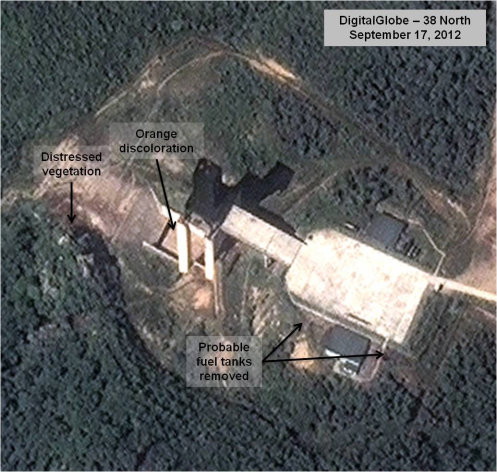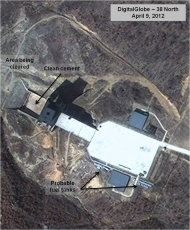
This Sept. 17, 2012 satellite image provided by DigitalGlobe and annotated by the U.S.-Korea Institute at Johns Hopkins School of Advanced International Studies, 38 North, shows a facility in Sohae, North Korea where analysts believe rocket engines have been tested in a sign North Korea continues to develop its long-range ballistic missiles. The analysis provided to The Associated Press is based on satellite images taken as recently as late September of the Sohae site on the secretive country's northwest coast. In April, the North conducted a failed attempt to launch a rocket from there carrying a satellite into space in defiance of a U.N. ban. The website of the U.S.-Korea Institute at SAIS said Monday Nov. 12, 2012 that it remains unclear whether the North is preparing a rocket launch but predicted it may embark on new rocket and nuclear tests in the first half of 2013. (AP Photo/DigitalGlobe/ U.S.-Korea Institute at SAIS)
Satellite imagery shows NKorea missile activity — Satellite imagery indicates North Korea has been testing rocket engines, a sign it continues to develop its long-range ballistic missiles, a U.S. academic institute said Monday.
The analysis provided to The Associated Press is based on satellite images taken as recently as late September of the Sohae site on the secretive country's northwest coast. In April, the North launched a rocket from there in a failed attempt to propel a satellite into space in defiance of a U.N. ban.
The analysis on the website of the U.S.-Korea Institute at Johns Hopkins School of Advanced International Studies, which is called "38 North," said it remains unclear whether the North is preparing another rocket launch but predicted it may embark on new rocket and nuclear tests in the first half of 2013.

This April 9, 2012 satellite image provided by DigitalGlobe and annotated by the U.S.-Korea Institute at Johns Hopkins School of Advanced International Studies, 38 North, shows a facility in Sohae, North Korea where analysts believe rocket engines have been tested in a sign North Korea continues to develop its long-range ballistic missiles, The analysis provided to The Associated Press is based on satellite images taken as recently as late September of the Sohae site on the secretive country's northwest coast. In April, the North conducted a failed attempt to launch a rocket from there carrying a satellite into space in defiance of a U.N. ban. The website of the U.S.-Korea Institute at SAIS said Monday Nov. 12, 2012 that it remains unclear whether the North is preparing a rocket launch but predicted it may embark on new rocket and nuclear tests in the first half of 2013. (AP Photo/DigitalGlobe/ U.S.-Korea Institute at SAIS)
The analysis underscores the challenges posed by the North's weapons programs to the United States and its allies as President Barack Obama heads into his second term. Washington's most recent attempt to negotiate a freeze in the North's nuclear program and a test moratorium in exchange for food aid collapsed with the April launch that the U.S. regarded as a cover for testing ballistic missile technology.
In 2009, North Korea tested a long-range missile and its second nuclear weapon within months of Obama taking office, and the 38 North analysis says North Korea may conduct new tests in the aftermath of presidential elections recently completed in U.S. and due in December in South Korea. That could be viewed as a tactic to exert more pressure on the close allies as the North seeks recognition as a nuclear power.
Last month, Defense Secretary Leon Panetta said North Korea continues to prepare for such tests, and the North, angered by Washington's recent agreement to let Seoul possess missiles capable of hitting all of its territory, has recently claimed that the U.S. mainland is within range of its missiles.
According to South Korea's Defense Ministry, North Korean missiles are believed to have a range of up to about 4,160 miles, putting parts of Alaska within reach. But the North is not believed to have mastered the technology needed to hit a distant target and miniaturize a nuclear warhead to mount on a missile. The North has a spotty record in test launches, raising doubts about whether it is truly capable of a long-distance attack.
The 38 North analysis concludes that since the failed launch on April 13 of the Unha-3 rocket that disintegrated shortly after takeoff, the North has conducted at least two, and possibly more, tests of large rocket motors at a test site about a half mile away. The tests are critical for the development of new rockets.
"Pyongyang's large motor tests are another clear sign that its missile program is moving forward. Whether there will be another long-range missile test this spring remains unclear but is a distinct possibility," said Joel Wit, a former U.S. State Department official and editor of 38 North.
An April 9 satellite image shows what appear to be dozens of fuel tanks near a stand used for conducting tests of rocket engines. A Sept. 17 image shows the tanks are no longer there, and a flame trench has been stained orange and surrounding vegetation has been burned from the exhaust of an engine. An image from Sept. 28 indicates a further test has taken place.
The analysis was written by Nick Hansen, a retired expert in imagery technology with a 43-year experience in national intelligence.
He concludes the tests were likely of the first-stage engines of the Unha-3 or the new, bigger KN-08 long-range missile first viewed in a military parade in Pyongyang shortly after the April launch attempt.
The capabilities of the KN-08 and whether it could pose a potential threat to the continental United States remains unclear. Some analysts have also questioned whether the half-dozen of KN-08 missiles shown at that parade were genuine or just rigged up for show.
The analysis by 38 North says the Sept. 28 images also show construction work on the upper platform of a launch tower at Sohae to enable it to accommodate even larger rockets than the Unha-3 or KN-08. ( Associated Press )
No comments:
Post a Comment